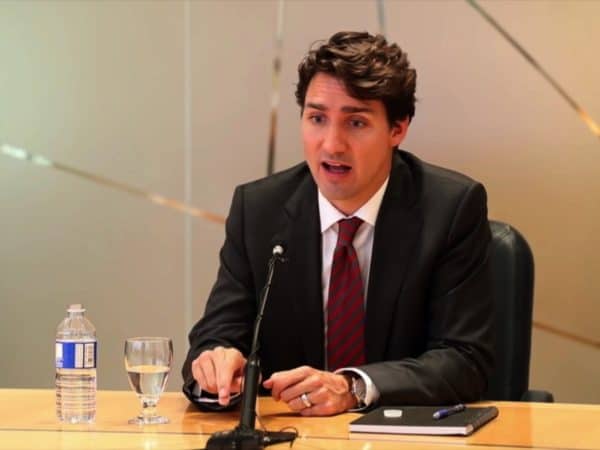Why Trudeau’s tough talk on marijuana enforcement may fall on deaf ears


“People are right now breaking the law.” Those words were among the first Canadian Prime Minister Justin Trudeau had to say to the editorial board of the Toronto Star last Friday.
Trudeau, whom the Star described as “frustrated” sat down to talk about why he felt municipalities should be shutting down illegal pot dispensaries that now seem to cluster on the streets of most major Canadian cities, selling medicinal cannabis and often forgoing the requirement of a doctor’s prescription.
The Prime Minister admitted the timeline of marijuana legalization in Canada may be causing municipal police forces to behave as though the switch to legal pot has already happened, but he reminded that it has not.
“We haven’t changed the laws. We haven’t legalized it yet. Yes, we got a clear mandate to do that. We’ve said we will. We’ve said we’re going to do it to protect our kids and to keep the money out of the pockets of criminals,” he said.
Canada is in a funny place with marijuana right now. It is being sold openly on our streets, investors are making small fortunes from a stock boom in cannabis companies, and some of our provinces border states that have already made it legal.
Canada is in a funny place with marijuana right now. It is being sold openly on our streets, investors are making small fortunes from a stock boom in cannabis companies, and some of our provinces border states that have already made it legal.
But it is still illegal here and Trudeau clearly meant to lay that plain last Friday.
“So, I don’t know how much clearer we can be that we’re not legalizing marijuana to please recreational users,” he said. “I mean, that will be a byproduct. We recognize that that is something that’s going to happen when it happens, but it’s not happened yet.”
But Trudeau’s push to get cops to take marijuana seriously one last time will likely fall on deaf ears because those same cops are dealing with the biggest drug crisis they have seen in decades in the form of fentanyl.
The problem of fentanyl has literally changed the way policing happens in many municipalities. The CBC recently rode along with two officers who worked a particularly bad stretch of Surrey, B.C. The CBC’s Eric Rankin noted that the police aren’t arresting people for possession anymore, they are simply trying to contain the damage from a drug that has killed hundreds in the province this year. Sometimes they are called upon to inject naloxone, which reverses the effects of the opiate.
This is serious stuff. But marijuana’s long-term effect on teens would almost certainly fall behind the monumental opiate crisis that is currently killing Canadians by the hundreds in most any thinking feeling person’s mind.
“It is simply alarming,” said RCMP Chief Superintendent Brian Cantera. “[It’s] certainly a game-changer in terms of public safety and the deaths associated to it.”
The stress of dealing with the crisis is one thing, but add that to the fact that fentanyl is so toxic that even touching or breathing it in can be fatal.
“It’s spreading across the country, leaving a trail of misery and death,” wrote RCMP commissioner Bob Paulson recently. “First responders and the public need to know that even being near it can make you sick, or worse.”
Trudeau told the Toronto Star’s editors that one of his major concerns is protecting children from the effects of marijuana on a developing brain. His argument that damage can come from the early use of the drug is backed up by the most recent peer reviewed research on the subject.
This is serious stuff. But marijuana’s long-term effect on teens would almost certainly fall behind the monumental opiate crisis that is currently killing Canadians by the hundreds in most any thinking feeling person’s mind.
The recent discovery of carfentanil, a drug that is one-hundred times as powerful as fentanyl, in the Waterloo, Ontario area has officers there frightened. The drug is 10,000 times as toxic as morphine, and surviving an injection might just require a herculean effort from a first responder.
“We’re hearing reports of eight or nine or more doses of naloxone being used in other communities to revive overdose victims,” said Michael Parkinson of the Waterloo Region Crime Prevention Council.
Context is context. And asking a police officer who has just risked personal harm to inject a victim with naloxone eight times to worry about that little pot shop on the corner that might be legal next May seems a stretch.
Below: Prime Minister Justin Trudeau talks to the editorial board of the Toronto Star, Friday December 2, 2016.
Nick Waddell
Founder of Cantech Letter
Cantech Letter founder and editor Nick Waddell has lived in five Canadian provinces and is proud of his country's often overlooked contributions to the world of science and technology. Waddell takes a regular shift on the Canadian media circuit, making appearances on CTV, CBC and BNN, and contributing to publications such as Canadian Business and Business Insider.
